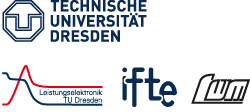

Technische Universität Dresden
www.tu-dresden.deProfessur Leistungselektronik,
Elektrotechnisches Institut (ETI),
Fakultät Elektrotechnik und Informationstechnik,
Technische Universität Dresden
The main research areas of the Power Electronics Chair are power semiconductors, power converters and converter control. Typical applications are electrical drives, renewable energies, transmission and distribution of electrical energy, traction, automotive and technological power supplies. Specialized laboratories and test benches have been developed in order to create a link between theory and practical applications. In two labs for medium voltage components power semiconductors and their corresponding electronic infrastructure like gate units, power supplies, voltage and current sensors, etc. can be studied in detail. In a power converter lab new converter concepts like multilevel converters are investigated and verified on lab test benches and prototypes. A fast prototyping four quadrant drive test bench is applied to investigate and to verify new control and modulation methods for converters (e.g. active rectifiers) and electrical drives.
http://tu-dresden.de/die_tu_dresden/fakultaeten/fakultaet_elektrotechnik_und_informationstechnik/eti/le/
Institut für Feinwerktechnik und Elektronik-Design (IFTE),
Fakultät Elektrotechnik und Informationstechnik,
Technische Universität Dresden
The research focus of the Institute of Electromechanical and Electronic Design (IFTE) of Technische Universität Dresden is on precision engineering and on design, test and optimisation of electromechanical and electronic devices and systems. In this context, novel magnetic actuators and electrodynamic drive systems with embedded control are developed together with partners from public and industry. Fields of application for these drives are for example automation and handling or small machine tools. EtherCAT hereby enables for real-time transfer of set positions and other control commands.
http://www.ifte.de/
Professur für Werkzeugmaschinenentwicklung und adaptive Steuerungen,
Institut für Mechatronischen Maschinenbau,
Fakultät Maschinenwesen,
Technische Universität Dresden
The Institute of Mechatronic Engineering was founded in 2018 by merging the Chair of Fluid-Mechatronic Systems, the Chair of Machine Tools Development and Adaptive Controls, the Chair of Magnetofluiddynamics, Measurement and Automation Technology, and the endowed Chair of Construction Machines. The unifying element is the holistic mechatronic approach in the consideration of machines and processes. The focus is on the areas of virtual development methods, system integration and networking, test stand and control system development, as well as machine and process analysis. The Chair of Machine Tools Development and Adaptive Controls offers a wide variety of lectures, seminars and laboratories regarding design, development and analysis of machine tools and their components, and design of machine control systems.
www.iwm.info
